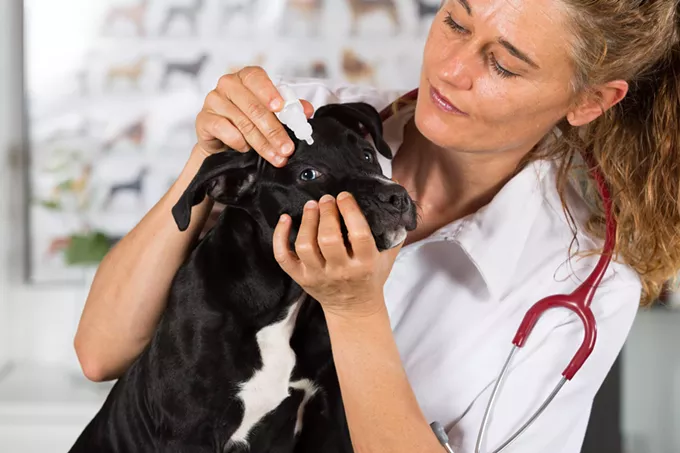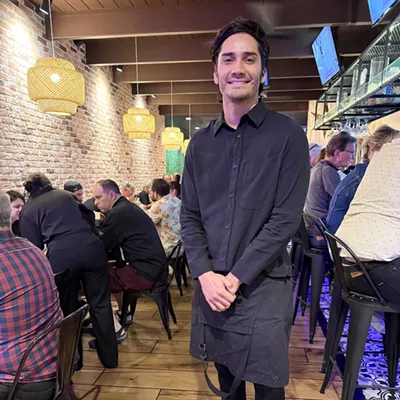Pet owners prepare — a dangerous disease is on the loose. The killer’s name is Canine Parvovirus (also known as parvo) and without a completed course of vaccinations, it can be deadly.
“(Parvo) is a deadly virus that affects primarily young puppies that are either not vaccinated or not completely through their vaccine series,” veterinarian Jennifer Miller said. “It is spread in the poop, so if you have an infected dog, they can shed the virus through the poop. They also shed it through vomit or any type of bodily fluids.”
It can even come into the house or yard on a person’s shoes, according to Dr. Rachel Kreisler, a veterinarian and professor of shelter medicine and epidemiology at Midwestern University in Phoenix. Spring and early summer is the peak season for infections to occur
“It lives in the environment for a long time, … even through harsh environments, like the extreme heat that (we) get in Arizona,” Miller said. “It will live in the environment for up to a year and it’s super contagious.”
“Parvo is one of the harder viruses to kill,” Kreisler said. “This is something that is really hard to eliminate from the environment, which is why puppies are so much at risk.”
While an adult dog up to date on its vaccines can usually resist the infection, it’s very easy for puppies to become infected, especially when it is new to the home.
“Everybody is excited that they got a new puppy,” Miller said. “They’re taking it out, they’re showing it everywhere. They’re going to the park, they’re going to a family member’s or a friend’s, they’re going places and all that puppy has to do is walk through an area that’s been contaminated by the virus… That virus can stick on a puppy’s paw, then the puppy grooms the paw. They lick their paws, it’s a normal puppy thing to do.”
As soon as parvo gets into the mouth, that’s how fast the puppy is infected. Miller said it’s not always easy to spot a parvo infection because the symptoms mimic a lot of serious conditions. However, the sooner the infection is diagnosed, the better the chances of recovery.
Look for these signs: “Going off the food, being a little bit mopey, vomiting, diarrhea,” Miller said. “If you have a young puppy that’s not completely vaccinated and you see these signs, talk to your veterinarian immediately.”
Should a pup be diagnosed with parvo, there is hope with a new medicine that’s been on the market for about a year. Elanco, a pharmaceutical company for animals, has developed Canine Parvovirus Monoclonal Antibody.
“It is a single IV dose where the clinic would administer that to the puppy and it basically gives them a high level of antibody protection,” Miller said. “Those antibodies, they find the virus, they stop the virus so it doesn’t cause additional destruction to the guts for these puppies.”
Miller is a staffer for Elanco, but area vets have also administered the monoclonal antibody with success.
“(It’s) really exciting because before, we didn't have anything,” Kreisler said. “If you can get these monoclonal antibodies on board, especially the earlier the better, it can really help the patient recover so much faster.”
Prevention is the best medicine for parvo, which, according to Miller, is diagnosed around the country at a rate of about 900 cases a day. Keeping dogs up to date on their vaccines will go a long way to keeping parvo at bay. However, as with humans, vaccines take time to be effective.
“If you have a fully vaccinated dog, it’s a lot less likely that that dog is going to get infected with parvo,” Miller said. “The hard part is, as we’re entering into the parvo season right now, even if folks got their dog completely vaccinated right now, it’s probably not going to be effective tomorrow. The timing is just not there to get these guys completely protected.”
So, what’s a puppy owner to do?
“We can start vaccinating for it in puppies as young as four weeks of age and that’s really the most powerful tool we have,” said Dr. Sarah Neuser, the veterinarian for the Humane Society of Southern Arizona.
Owners can take other actions, too.
“In addition to vaccination, of course, avoiding dog poop is pretty important because it is in all the body secretions but dog poop is kind of our number one way,” Kreisler said. “A lot of time we say if you have a new puppy, don’t take it to high-risk areas.”
That includes dog parks.
“If it was me and I had a puppy I would not take it to a dog park until it’s 20 weeks of age and all of its vaccines are on board,” Neuser said.
Kreisler said to seek out more protected places like dog classes offered by veterinarians or reputable kennels.
“You don’t want to lock your puppy up in a bubble and have them afraid of the world,” she said.
“I would start introducing it to my neighbor’s dog, who I know is vaccinated and healthy,” Neuser said. “I would start introducing it in certain and controlled situations so that it gets the social skills it needs to be a healthy, happy puppy, but I’m not setting it up for failure by exposing it to potentially unknown environments.”











